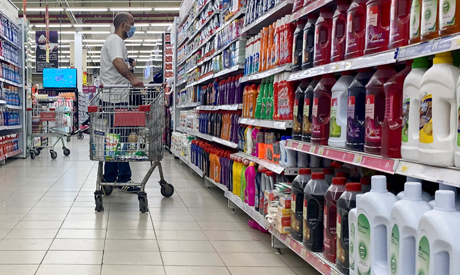
Preventive measures have affected consumer behavior
Egypt’s annual inflation rate has defied predictions made earlier this year by dropping from 5.9 per cent in April to five per cent in May despite the latter coinciding with the holy month of Ramadan when the consumption of food and beverages usually increases.
According to the Central Agency for Public Mobilisation and Statistics (CAPMAS), the rate of change in the prices of food items went down by 0.7 per cent on an annual basis in May as a result in decreases in the prices of poultry, grains, bread, rice, and vegetables after an increase of 1.3 per cent in April.
Mohamed Abu Basha, a macroeconomic analyst with investment bank EFG Hermes, said the bank had expected annual inflation to reach 5.9 per cent, but a drop had occurred due to decreases in the price of vegetables as a result of reduced demand coupled with the lockdown that forced shops to close at 5pm on weekdays and to shut completely on Fridays and Saturdays to halt the spread of the Covid-19 coronavirus.
The consumption of non-essential food items, such as the pastries that are usually highly in demand in Ramadan, had gone down, he noted, either because of the lockdown or because of decreasing purchasing power among families.
Mona Mustafa, an economic analyst, said the measures to halt the spread of the coronavirus had negatively affected the purchasing power of many individuals despite expectations for demand to increase in Ramadan.
Several private-sector companies have laid off workers or introduced cuts to salaries to avoid closure since mid-March. Irregular and seasonal workers numbering as many as 600,000 have also suffered, and reductions in pay have been exacerbated in the absence of financial or insurance cover for such workers.
A CAPMAS survey released earlier this week showed that 26 per cent of those surveyed have lost their jobs because of Covid-19. Of those who remain employed, 73 per cent faced a decline in their income due to the taken preventive measures.
Most of those surveyed said they changed consumption patterns by replacing their weekly purchases of fish, poultry, and meat with legumes and canned goods.
A number of store managers have reported a drop in purchases, including Mohamed Al-Hawari, owner of Al-Hawary and the Hyper One hypermarkets, who said that purchasing power had decreased by 30 per cent in Ramadan despite a drop in the prices of many staple items.
Face masks, medical gloves, sanitisers and detergents were still highly in demand, however, he added.
One manager at an international hypermarket chain said the number of people shopping at his store had dramatically decreased due to the night-time curfew and the closure of malls on Fridays and Saturdays.
In late April, Pharos, an investment bank, said that the spread of the Covid-19 pandemic could halt non-essential purchases, leading to problems for vehicle, textiles, and electronics companies, as people redirected their finances to other purchases.
A Pharos research paper said that local demand for textiles would be negatively affected by the curfew imposed on retail outlets, and that export demand would be either delayed or cancelled due to weak global demand. Raw material imports depending on oil would also face a risk of postponement, it said.
Pharos said the lockdown and social-distancing measures would affect consumer behaviour in the electronics sector, resulting in lower demand, the closure of factories, delays in accessing spare parts, and postponing the release of new smart phone models.
Another investment bank, Prime Holding, said in a note published this week that the current low inflation had lent support to the argument that the demand side of the economy would exhibit the negative impacts of the Covid-19 pandemic on the economy as a whole.
“The story in a nutshell is people have no money to buy new things and even if they do, they have a deep feeling of financial insecurity as they cannot predict what the future holds,” wrote investment expert Hani Tawfik on Facebook .
According to CAPMAS , 48.2 per cent of all households surveyed see their income declining over the next three months.
“There is a severe unemployment problem as a result of the inability of enterprises to sell their production so they resort to the laying off of employees or the reduction of their salaries. This is in addition to severe scarcity of liquidity, a slow turnover on capital, and almost a total paralysis of the economy.”
He explained that people used their cash money to buy LE200 billion of the 15 per cent yielding certificates of deposits offered by the National Bank of Egypt and Banque Misr since February.
Prime expected inflation in the second half of the year to be influenced by the depreciation of the Egyptian pound, as well as by recently announced hikes in electricity tariffs.
“However, these factors should produce no significant pressures on the inflation outlook because the pound had appreciated prior to the crisis and electricity tariff hikes had excluded both the commercial and industrial sectors, which will limit the probability of a second-round effect on final prices,” Prime added.
The pound has gone down by 2.4 per cent against the dollar since late April.
*A version of this article appears in print in the 25 June, 2020 edition of Al-Ahram Weekly
Short link: